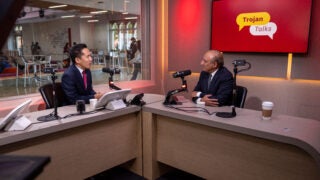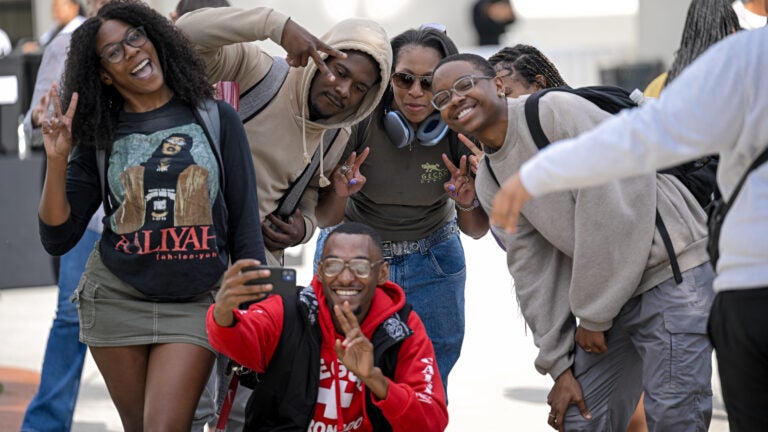
Trojans enjoy the SC Family Reunion event on Thursday. (USC Photo/Sean Dube)
Inspiring words, performances and competitive games of double Dutch highlight Black History Month ‘Family Reunion’
The closing event for Black History Month at USC draws more than 2,000 attendees to Founders Park.
Damarea Parker took the stage at Founders Park on the USC University Park Campus on Thursday and announced: “Let’s do what we do at a family reunion, and that’s have fun!”
Parker, supervisor of the Center for Black Cultural and Student Affairs, got plenty of cooperation over the next four hours from the approximately 2,000 people who attended the family reunion-themed closing event for Black History Month at USC. Popular DJ Wall-E played tunes between live dances, musical performances and remarks that centered on the theme “Empowering Excellence: Celebrating Black History through the Arts.”
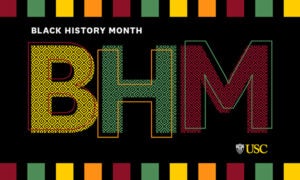
USC President Carol Folt kicked off the program by pointing out how the “SC Family Reunion” event has grown exponentially each of its three years.
“It’s fantastic to see this — the joy of this moment being shared with so many people,” Folt said. “This has really been an amazing month with all the events that have been going on — more than 20 events with book signings, movie screenings and performances.”
Folt also highlighted the accomplishments of several notable Black Trojan faculty and alumni from throughout the university’s 23 schools. She pointed out that Colman Domingo of the USC School of Dramatic Arts is a current Academy Award nominee for Best Actor for his performance in the film Rustin and that USC Dornsife College of Letters, Arts and Sciences Distinguished Professor Percival Everett’s novel Erasure inspired the film American Fiction, an Academy Award nominee for Best Picture and other awards.
Respect for our heroes — and each other
One of the featured speakers, Associate Dean for Inclusion and Diversity Initiatives Kenneth Bonner, said that respect and diversity are perhaps more crucial now than ever.
“In a world where divisions seem to loom large, the stories of African American heroes teach us that respect for one another’s humanity,” he said.
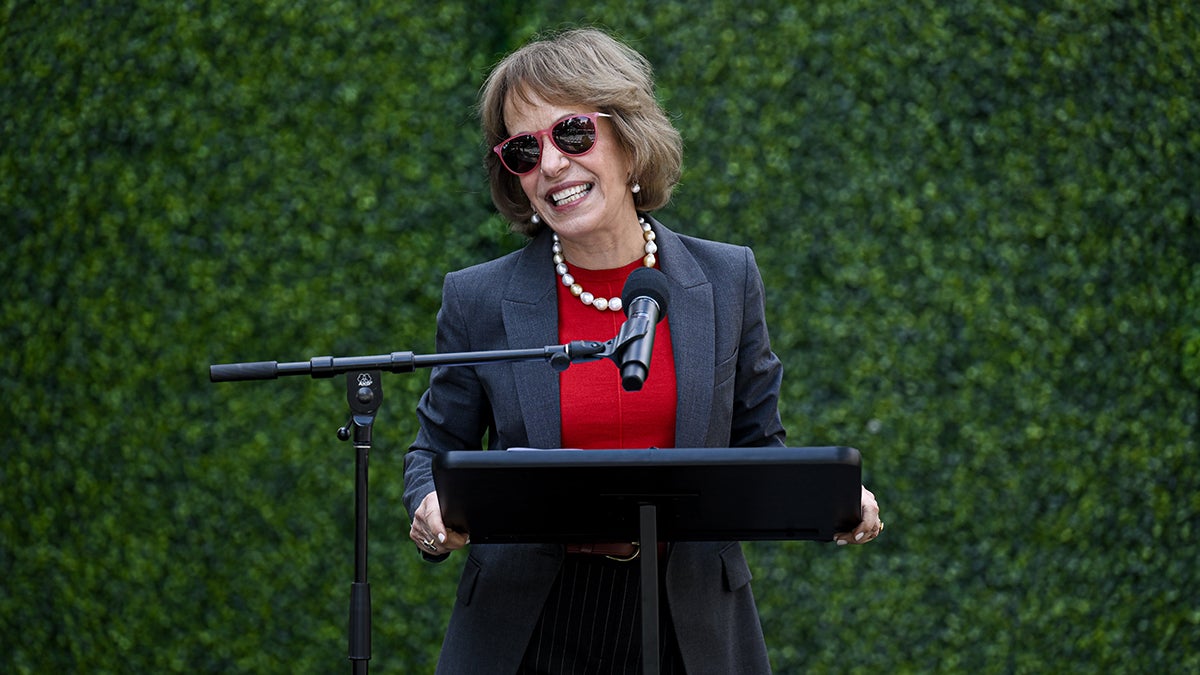
Pedro Noguera, dean of the USC Rossier School of Education and the keynote speaker, chose to shine a light on one of those heroes in his remarks.
Noguera asked how many in the crowd had heard of Bridget “Biddy” Mason. Not seeing many hands go up, he went on to explain that this woman — who was born into slavery — became a multimillionaire and one of Los Angeles’ first prominent Black landowners. After winning her freedom in court in 1856, Mason used the money she earned working as a nurse and midwife to purchase land in the heart of downtown L.A.
“I want you to also reflect on this history,” Noguera said to the crowd. “Because this history is a reminder that we persevere, even during the worst of times — even in the face of great oppression and discrimination, we find a way.”
Samirah Moody, a junior at the USC Annenberg School for Communication and Journalism and another featured speaker, honored the event’s theme by explaining how “as a track and field athlete, my body serves as the paintbrush and the canvas.”
“Art is expression, and everyone should feel empowered to find their art,” said Moody, a sprinter with Olympic aspirations and co-president of the United Black Student-Athlete Association. “Whatever allows you to express yourself authentically is a powerful tool not only for you, but the world at large.”
Dancing and double Dutch
The stage wasn’t big enough to contain the energy and the moves of juniors Malachi Stevens and Xavier Williams of the USC Kaufman School of Dance. They danced to live hip-hop music performed by Chase Paves and wore clothing designs by Brynn McIntosh, both USC alumni. To the delight of the crowd, the pair were soon doing their hip-hop and house dance routines on the sidewalks.
“This is our first time performing with a live artist,” Stevens said after the performance. “It was good to bounce energy off of him and off of Xavier, and then also getting the crowd a little bit more engaged. It was really cool.”
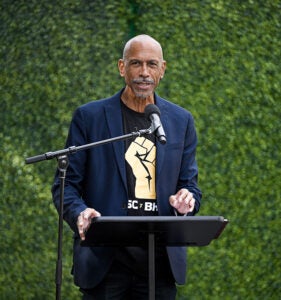
Williams described the experience as “amazing” and enjoyed that attendees stood up and danced, rather than sitting down and watching. He also pointed out that since the event was taking place during leap year: “It’s like an extra day for Black History Month, so that’s also really beautiful.”
Tables were set up for attendees to play spades and dominoes, but the most popular activity was double Dutch, a game involving two giant jump ropes moving in opposite directions. USC Rossier graduate student Izzy Batiste wowed the crowd by successfully navigating the jump ropes for a long stretch after a series of other attendees failed to last more than a few seconds.
“I’m a dancer, so it’s really easy for me to like catch rhythm and catchy beats,” Batiste said after his turn was up. “To just be able to kind of jump in and to be able to keep on time, it’s fun to do it in a crowd.”
Attendees had their choice of three food stations, which included macaroni and cheese and Jamaican patties from Simply Wholesome; beef and vegan sliders from Fixins; and beef hot dogs and vegan hot dogs from Earle’s on Crenshaw.
As she played spades and enjoyed a hot dog, junior Janaiya Hodges of the USC Marshall School of Business said the event was “very reminiscent of a family reunion.”
“I’m from the South, so this is very much a competition,” she said of the card game. “But everyone’s having fun. It’s a little chilly out here today, but we’re warming it up.”
Students reflect on history
Holding a dish with macaroni and cheese in one hand and a cup of lemonade in the other, student Bishop Walton of the USC Gould School of Law looked around for his friends and a place to sit. He said he was happy to see a bustling crowd celebrating what he considers to be such an important month.
“There are others who have paved the way for you, so understanding your history, knowing your history, I think is important,” Walton said. “If we know our history, we know where our future could be.”
The future attorney is concerned about any efforts to “suppress” Black history because “that can result in going back into places that we shouldn’t be going into.”
Student Ogechi Obed of the Keck School of Medicine of USC, who was having lunch with friends nearby, is also concerned about proposed legislation or policies attempting to restrict lessons about race and racism in the United States.
“Being a Black person growing up in the U.S., I’ve always been entrenched in the history,” Obed said. “I think a lot of people are committed to staying ignorant, but events like this, that are like really inviting, can let people come in and — in a non-intimidating way — engage with something that they don’t know about.”


